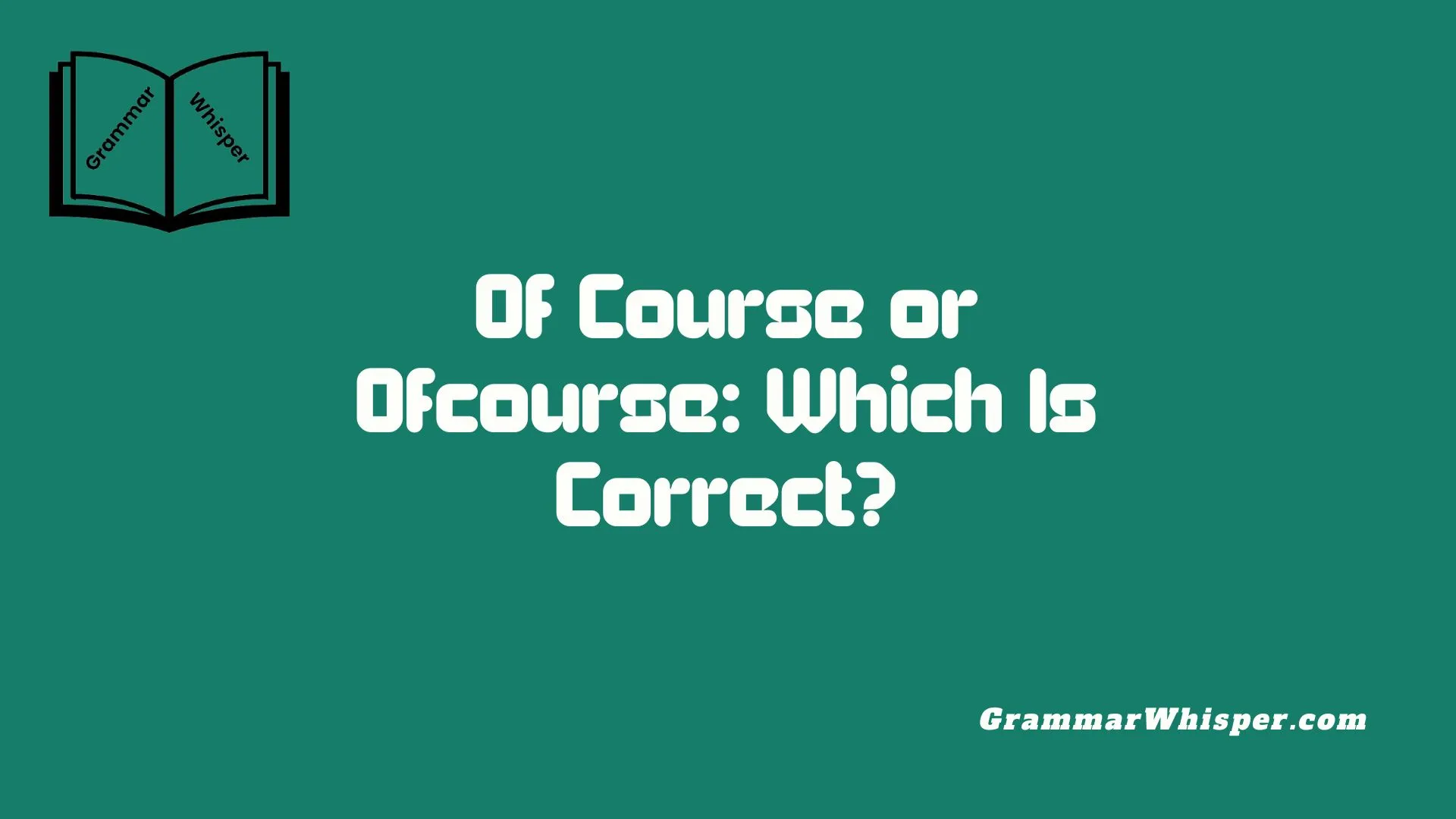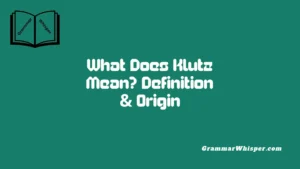When I was teaching a class on business English, one of my students emailed me a formal cover letter draft. It looked great – until I noticed the phrase “Of Course or Ofcourse” used multiple times. That tiny spelling difference – a missing space – had a bigger impact than you’d imagine. This isn’t just a cosmetic issue; such a mistake can lower your credibility in academic, professional, or even casual conversations. Writing “of course” as one word is incorrectly applying how we speak to how we should write. These small errors create unnecessary confusion, especially in formal settings.
There’s a fascinating history behind this phrase, rooted in English grammar. While “of course” is a common part of everyday usage, it’s still a point of debate among learners. When said aloud, it feels like one word, which is why the misspelling “ofcourse” feels natural. But the rules of the language are clear. A solid guide reminds us that clarity in context matters. I’ve seen even fluent learners trip up here. If you’re unsure, refer to an example, review the details, and trust the structure the language provides. These small habits, when corrected, go a long way in building polished, confident communication.
Quick Answer: ‘Of Course’ Is Correct, ‘Ofcourse’ Is Not
Let’s be clear upfront: “of course” is the only correct spelling.
The version “ofcourse” is a common mistake, not recognized by dictionaries like Merriam-Webster or Oxford. It’s not informal slang or an alternate form – it’s simply incorrect.
“Of course” is a two-word prepositional phrase that means naturally, certainly, or without a doubt.
What Do Major Dictionaries Say?
| Dictionary | Spelling Accepted | Notes |
| Merriam-Webster | of course | No entry for “ofcourse” |
| Oxford English Dictionary | of course | “Ofcourse” redirects to correct form |
| Cambridge Dictionary | of course | “Ofcourse” not recognized |
The Grammar Behind ‘Of Course’: Why It’s Two Words
Grammatically, “of course” consists of a preposition (“of”) and a noun (“course”). Together, they form a prepositional phrase that functions adverbially – modifying entire sentences.
Why Not One Word?
English rarely fuses prepositions and nouns into one compound unless the new word gains a distinct meaning (e.g., “into” or “without”). “Of course” hasn’t undergone such transformation.
Examples of similar correct phrases:
- “In fact”
- “By all means”
- “At large”
- “For sure”
Each remains two words because the meaning doesn’t shift enough to become a compound word.
The Etymology of ‘Of Course’: Where It Comes From
The phrase dates back to the 16th century, when “course” referred to a natural or expected progression of events, like the course of a river or the course of events.
“Of course” originally meant something happening in the natural course of things.
Historical Origin
- Earliest known usage: Mid-1500s in formal English writings.
- Meaning: Something that follows naturally from what came before.
Evolution of the Phrase
- 17th century: Used in formal philosophical and political texts.
- 19th century onward: Entered colloquial speech with the tone of reassurance, agreement, or obviousness.
Real-World Examples: ‘Of Course’ in Action
Everyday Situations
- Friendship: “Of course I’ll help you move this weekend.”
- Customer Service: “Of course, we can offer a refund.”
Business:“Of course, I’ll send over the report by EOD.”
Different Tones, Same Phrase
| Tone | Example Sentence | Meaning |
| Sincere | Of course, I support your decision. | Affirmation |
| Sarcastic | Oh, of course, you’re late again. | Ironic remark |
| Polite | Of course, take your time. | Courteous reply |
| Assertive | Of course, this is the only solution. | Strong opinion |
Common Misspellings and Auto-Correct Errors
The incorrect form “ofcourse” often pops up for a few reasons:
Why It Happens
- Typing quickly on mobile where autocorrect doesn’t catch it
- Non-native speakers mimicking spoken rhythm
- Lack of grammar checking tools on informal platforms
How to Avoid It
- Add “of course” as a custom shortcut in your keyboard settings
- Use spell-check or apps like Grammarly or Hemingway
- Train yourself to pause and re-read messages before hitting send
Remember: A small space makes a big difference.
Misuse in Writing: What It Says About You
Misspelling “of course” as “ofcourse” in emails, cover letters, or blogs can come off as careless or unprofessional.
Impact on Perception
- Resumes: May suggest a lack of attention to detail
- Business writing: Could weaken your credibility
- Academic work: Risks appearing grammatically unsound
“A reader will forgive a small typo – but a consistent grammar mistake becomes a pattern.” – Style Manual for Writers
When and Where to Use ‘Of Course’ Correctly
This phrase is widely flexible but has its limits. Here’s how to use it accurately:
Correct Contexts
- To affirm or agree “Of course, I’ll be there.”
- To politely reassure “Of course you can borrow the book.”
- To state the obvious “Of course water boils at 100°C.”
Where It Doesn’t Fit
- As a substitute for a factual response: “Of course” is subjective.
- To interrupt or overstate agreement: Avoid repetition.
Pro Tip
Avoid pairing it with statements where ambiguity or disagreement is involved. It may sound dismissive.
Variations of Meaning: Context Matters
The tone and placement of “of course” shift its meaning dramatically.
By Sentence Placement
- Beginning: “Of course, you’re invited.” → Reassurance
- Middle: “You are, of course, included.” → Emphasis
- End: “You’re invited, of course.” → Affirmation
Subtle Differences
| Use Case | Tone | Implied Emotion |
| Polite | Courteous | Respect |
| Enthusiastic | Warm | Encouragement |
| Sarcastic | Dismissive | Frustration |
‘Of Course’ vs Similar Phrases
Let’s look at alternatives and see how they compare.
| Phrase | Similarity | When to Use |
| Naturally | Very close | Interchangeable in casual speech |
| Certainly | Formal | Use in professional settings |
| Obviously | Can sound arrogant | Use carefully to avoid offending |
| Surely | Less common | British tone, rhetorical questions |
| By all means | Strong affirmation | Granting permission |
Why English Learners Struggle With This Phrase
For ESL learners, “of course” seems straightforward when spoken but becomes tricky in writing.
Top Issues
- Direct translations often combine words
- Speech rhythm makes it sound like a single word
- Informal chats lead to bad habits
Teaching Tip
Use visual aids and sentence completion exercises:
“Do you want some tea? ____!”
- Options: Yes / Ofcourse / Of course ✅
Use in Literature, Film, and Pop Culture
The phrase has made its way into countless books, movies, and shows.
Examples from Pop Culture
- Harry Potter: Dumbledore: “Of course it is happening inside your head…”
- The Simpsons: Homer: “Of course I’m not going to wear pants.”
- Marvel Movies: Tony Stark: “Of course I have a plan.”
Why It’s Used
- To reinforce certainty
- Add tone or irony
- Create relatable dialogue
Final Tips to Remember ‘Of Course’
Quick Rules Recap
- Always two words: “of” + “course”
- Use for affirmation, reassurance, or obvious facts
- Be mindful of tone and placement in a sentence
Memory Tricks
- Think of “a course of action” → “of course” relates to that natural flow
- Say it aloud: You’ll hear the gap between the words
Tools to Help You
- Grammarly: Free and premium tools to catch such errors
- Microsoft Editor: Native tool with spelling and grammar AI
- Google Docs: Real-time suggestions for spacing and grammar
Conclusion
It may be tempting to skip over grammar and spelling in casual communication, but missteps like “ofcourse” instead of “of course” can quietly damage your credibility. Whether you’re writing an email, a novel, or a tweet, knowing the right form matters.
Use the phrase correctly, and you’ll sound polished, professional, and confident – of course.
FAQs
Can “ofcourse” be accepted in informal writing?
No. While common online, it’s still grammatically incorrect.
Is “ofcourse” a British English variant?
No. Both American and British English agree that “of course” is two words.
Can autocorrect be trusted with this?
Not always. Some mobile keyboards may skip this typo.
Is it ever okay to stylize it as one word for effect?
In fiction, maybe. But it’s a deliberate stylistic device, not standard English.











